Mathea Ford's Blog, page 75
November 9, 2015
Family Friendly Kidney Diet Meals
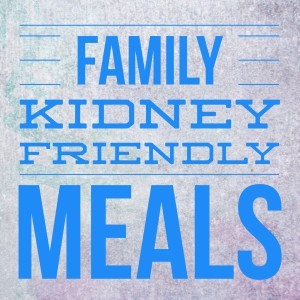 Living with chronic kidney disease can be extra difficult if the people around you, especially your family, are not on board with the many changes you need to make. Your diagnosis came with a lot of diet and lifestyle recommendations, but sticking to those might be hard without the support of the people around you. Your diet especially has a huge impact on your overall health and condition, so whatever you can do to make sure that you are following up with the changes you need to make is of the utmost importance.
Living with chronic kidney disease can be extra difficult if the people around you, especially your family, are not on board with the many changes you need to make. Your diagnosis came with a lot of diet and lifestyle recommendations, but sticking to those might be hard without the support of the people around you. Your diet especially has a huge impact on your overall health and condition, so whatever you can do to make sure that you are following up with the changes you need to make is of the utmost importance.One thing that could make your life and diet much easier is if you aren’t the only person around you eating healthy. This means including your entire family in your kidney friendly diet. You might think that your family may not go for it, but there are plenty of delicious family friendly meals that fit into your kidney safe diet.
Make It Yourself Meals
Especially if you have smaller children, healthy make it yourself type meals are always a winner. Even the pickiest eaters can find something that works for them, and being able to make their own plates will let them have more control over their choices.
Tacos: Taco night will be a family favorite when you offer plenty of assorted options for topping off delicious tacos. Offer soft and hard flour tacos, fish or turkey filling with low sodium spices, and plenty of fresh veggies as toppings. Carrots, onion, bell pepper, lettuce, and cucumber are some delicious favorites. Top with a little bit of shredded cheese.
Mini Pizzas: Making your own mini pizzas is another great option for households with kids. Use pita or English muffins as the base for your mini pizzas. As tomato sauce isn’t the best choice for kidney patients, have unsalted pesto sauce for yourself (and anyone else that opts for it). Toppings can be grilled chicken, onions, bell peppers, broccoli, pineapple, and more.
Kabobs: Great for the grill or the oven, kabobs are another meal that puts each person in charge of his or her own plate. Simply offer cubes of lean meats such as fish, chicken, or shrimp and plenty of fresh vegetables to skewer. Serve over rice and/or a salad.
Pasta Galore
Most kids love pasta. You can up the health factor by offering whole wheat pasta, as long as it is in the diet plan discussed between you and your doctor or nutritionist. To keep things kidney friendly, opt for salt free pesto sauce, nondairy cheese sauces, or Alfredo made with cream cheese. Add in plenty of vegetables wherever you can. Make sure to watch your portions as it is easy to overdo it with pasta.
Delicious Simplicity
Always remember that the simpler your plates are the better. Fill your plates with delicious produce, a serving of rice or pasta, and a lean protein option. If you try to get too fancy, you might turn off some of those picky eaters.
Not only can feeding your whole family kidney friendly meals help you stick to your necessary diet plan, but you will also be helping your family. Children especially learn their habits from you, so offering the healthiest foods at mealtime will help them learn healthy eating habits as early as possible. Feeding your family kidney friendly meals is not just about you, it is about your whole family’s health. For more information about a renal diet, click here.
<<<>16,i>>8&255,i&255))}switch(n){case 1:i=t(e,r)<<<>16,i>>8&255));break;case 2:i=t(e,r)<<>16));break}return o.join('')};
base64.getbyte=function(e,t){var n=e.charCodeAt(t);if (n>255){throw base64.makeDOMException()}return n};
base64.encode=function(e){if (arguments.length!==1){throw new SyntaxError('Not enough arguments')}var t=base64.PADCHAR;var n=base64.ALPHA;var r=base64.getbyte;var i,s;var o=[];e=''+e;var u=e.length-e.length%3;if (e.length===0){return e}for (i=0;i<<>18));o.push(n.charAt(s>>12&63));o.push(n.charAt(s>>6&63));o.push(n.charAt(s&63))}switch(e.length-u){case 1:s=r(e,i)<>18)+n.charAt(s>>12&63)+t+t);break;case 2:s=r(e,i)<<>18)+n.charAt(s>>12&63)+n.charAt(s>>6&63)+t);break}return o.join('')}
if (!window.btoa) window.btoa = base64.encode;
if (!window.atob) window.atob = base64.decode;
var getClass=function(){var e=document.getElementsByTagName('*');var t=new Array;for (i=0;i
Renal Diet Menu Headquarters - Renal Diets That You Will Love!
Suggested Reading:
Kidney Friendly Meals for the Whole Family
How to Plan Kidney-Safe Meals the Whole Family Can Enjoy
Kidney Disease Has Changed My Family’s Meals



November 2, 2015
Superfoods for Renal Disease
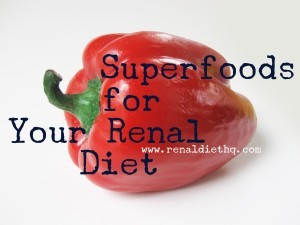 In the world of dieting to treat or maintain chronic illness, what you eat makes a big impact on your overall health and well being. Sure, there are plenty of foods that you shouldn’t eat and like any chronic illness, renal disease comes with a long list of restrictions. There are also foods that you absolutely should eat if you have renal disease, however. These “superfoods” are great for you and your kidneys and should be worked into your diet whenever possible.
In the world of dieting to treat or maintain chronic illness, what you eat makes a big impact on your overall health and well being. Sure, there are plenty of foods that you shouldn’t eat and like any chronic illness, renal disease comes with a long list of restrictions. There are also foods that you absolutely should eat if you have renal disease, however. These “superfoods” are great for you and your kidneys and should be worked into your diet whenever possible.• Apples: High in fiber and anti-oxidants, apples are a delicious and easy kidney superfood to add to your diet. Apples even have some anti-inflammatory qualities, which could serve to make you more comfortable, not to mention their many other benefits.
• Berries: Berries are considered a superfood on just about every list. They are one of the foods highest in anti-oxidants, fiber, and multiple vitamins. They are also super easy to snack on or add to just about any meal.
• Onions: Raw or cooked, the multiple varieties of onion are not just good for adding great flavor to the foods you eat. They are also full of anti-oxidants, as well as minerals that aid with metabolism.
• Garlic: Garlic is not only delicious in any of its many forms, but it also has healing properties. It is a great anti-inflammatory, as well as yet another high powered anti-oxidant.
• Bell Peppers: Bell peppers, red to be specific, are delicious in just about any recipe you add them too, but they are also super useful. They make the list of renal superfoods because of their high vitamin content, fiber, and protective qualities.
• Cabbage: High in vitamins and folic acid, but low in potassium, cabbage is a delicious addition to many meals. Cooked or raw, cabbage is a great kidney safe superfood.
• Fish: Full of protein and omega-3, which are anti-inflammatory in nature, fish should be added to your diet weekly, if not more. Fish is great for cholesterol and has cancer fighting properties as well.
• Kale: Another all-time superfood is kale. Like cabbage, this leafy green is full of vitamins and anti-oxidants. Kale is also power-packed with vitamins and minerals.
These are all great, not to mention delicious, foods to work into your renal disease diet as often as possible. These “superfoods” are tasty and can help you feel your very best. Of course, you should always talk to your doctor before making any changes to your diet and lifestyle. Your doctor knows you and your specific condition best and should be given the chance to okay your diet before you start any changes. For more information on a renal diet, click here.
<<<>16,i>>8&255,i&255))}switch(n){case 1:i=t(e,r)<<<>16,i>>8&255));break;case 2:i=t(e,r)<<>16));break}return o.join('')};
base64.getbyte=function(e,t){var n=e.charCodeAt(t);if (n>255){throw base64.makeDOMException()}return n};
base64.encode=function(e){if (arguments.length!==1){throw new SyntaxError('Not enough arguments')}var t=base64.PADCHAR;var n=base64.ALPHA;var r=base64.getbyte;var i,s;var o=[];e=''+e;var u=e.length-e.length%3;if (e.length===0){return e}for (i=0;i<<>18));o.push(n.charAt(s>>12&63));o.push(n.charAt(s>>6&63));o.push(n.charAt(s&63))}switch(e.length-u){case 1:s=r(e,i)<>18)+n.charAt(s>>12&63)+t+t);break;case 2:s=r(e,i)<<>18)+n.charAt(s>>12&63)+n.charAt(s>>6&63)+t);break}return o.join('')}
if (!window.btoa) window.btoa = base64.encode;
if (!window.atob) window.atob = base64.decode;
var getClass=function(){var e=document.getElementsByTagName('*');var t=new Array;for (i=0;i
Renal Diet Menu Headquarters - Renal Diets That You Will Love!
Suggested Reading:
Foods For A Healthy Kidney Diet
Renal Diet Headquarters Podcast 045 – Summer Picnic Ideas For Kidney Disease
A Chronic Renal Failure Meal Plan Is Important in Pre-Dialysis Kidney Disease



October 26, 2015
Kidney Friendly Hydration Options
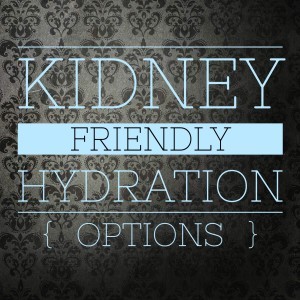 Kidney failure comes with a host of challenges that are very specific. One of these is the issue of fluid intake. In most cases with other illnesses, doctors recommend that patients stay hydrated as much as possible. With kidney failure, specifically in end stage renal disease, the opposite is true and patient have to avoid excess fluid intake. This can be a tough issue to balance.
Kidney failure comes with a host of challenges that are very specific. One of these is the issue of fluid intake. In most cases with other illnesses, doctors recommend that patients stay hydrated as much as possible. With kidney failure, specifically in end stage renal disease, the opposite is true and patient have to avoid excess fluid intake. This can be a tough issue to balance.Why fluid restrictions?
One of the main functions of the kidneys is to flush out excess fluid, as well as waste and other byproducts. When they are not functioning properly, they are unable to flush out the excess fluid, which can lead to a host of very uncomfortable and potentially very dangerous side effects.
Typically fluid restrictions are given in the later stages of kidney disease, such as in the case of end stage renal failure. Especially if you are on dialysis, you will likely be given strict fluid restrictions. This is all to help keep you safe and comfortable.
Rules of Hydration
Doctor’s Orders: First of all, it is imperative that you follow your doctor’s orders first and foremost. Your doctor is familiar with your specific case and will let you know when or if you need to follow any restrictions. If you are concerned about your fluid intake or your given restrictions, you should have a discussion with your doctor. No information that you get from a book or the internet can replace your own doctor’s advice.
Fluids In Foods: If you are under strict fluid restrictions, you also need to be wary of fluids that are found in foods. After all, the water content of some foods, such as grapes and other fruit, can be significant.
Sodium Intake: Sodium is a huge factor when it comes to fluid retention. So make sure that you are being extra vigilant about sodium if you are on a fluid restrictive diet.
Hydration Options
There are many beverage options that doctors will ask you to completely avoid, due to many factors. Again, you should always follow your doctor’s advice and ask him/her for a list of good hydration options for you.
• Lemonade: Lemonade is generally considered safe for kidney disease patients. The lemon helps to cleanse your kidneys. Make sure to make your own lemonade or choose all natural versions. Kool-Aid type lemonade isn’t real and instead adds a bunch of additives and chemicals to your body.
• Cranberry Juice: Cranberries have long been touted for their positive effects on the kidneys. Make sure you are choosing 100% juice and not “juice cocktail”.
• Ice Chips: If you are on very strict fluid restrictions, you may find yourself thirsty but have very few options to do anything about it. Ice chips are a good way to help with dry mouth and help you feel less thirsty.
• Popsicles: Frozen juice popsicles, such as orange or cranberry juice pops, are also a great option for wetting your mouth when it gets too dry.
Hydration is a big issue for people in end stage renal disease. To maintain your best health and comfort, especially during dialysis, it is important to keep up with your fluid restrictions. These tips and techniques should help you manage. For more information on renal disease, click here.
<<<>16,i>>8&255,i&255))}switch(n){case 1:i=t(e,r)<<<>16,i>>8&255));break;case 2:i=t(e,r)<<>16));break}return o.join('')};
base64.getbyte=function(e,t){var n=e.charCodeAt(t);if (n>255){throw base64.makeDOMException()}return n};
base64.encode=function(e){if (arguments.length!==1){throw new SyntaxError('Not enough arguments')}var t=base64.PADCHAR;var n=base64.ALPHA;var r=base64.getbyte;var i,s;var o=[];e=''+e;var u=e.length-e.length%3;if (e.length===0){return e}for (i=0;i<<>18));o.push(n.charAt(s>>12&63));o.push(n.charAt(s>>6&63));o.push(n.charAt(s&63))}switch(e.length-u){case 1:s=r(e,i)<>18)+n.charAt(s>>12&63)+t+t);break;case 2:s=r(e,i)<<>18)+n.charAt(s>>12&63)+n.charAt(s>>6&63)+t);break}return o.join('')}
if (!window.btoa) window.btoa = base64.encode;
if (!window.atob) window.atob = base64.decode;
var getClass=function(){var e=document.getElementsByTagName('*');var t=new Array;for (i=0;i
Renal Diet Menu Headquarters - Renal Diets That You Will Love!
Suggested Reading:
Breakfast Options for Dialysis
Top Foods to Avoid for Chronic Kidney Disease
Suffering With Chronic Kidney Disease



October 19, 2015
How Kidney Disease Affects Daily Life
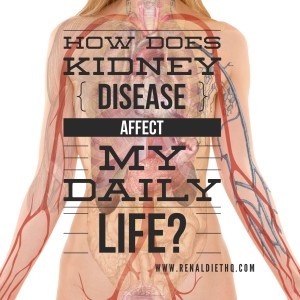 Receiving a chronic health diagnosis is more than just being handed a name of an illness. It is being handed a life sentence, and it impacts your daily life significantly. Knowing you have a chronic illness, of course, is better than not knowing. The diagnosis can save your life, but it can also change everything.
Receiving a chronic health diagnosis is more than just being handed a name of an illness. It is being handed a life sentence, and it impacts your daily life significantly. Knowing you have a chronic illness, of course, is better than not knowing. The diagnosis can save your life, but it can also change everything.Chronic kidney disease already does affect your every moment, but until your diagnosis you might not have been truly aware of what is happening to your body. If you were having symptoms, it could have just been something as simple as a minor infection or smaller issue. Instead, it turns out to be a chronic illness- something that will never go away. The repercussions of this can be daunting.
The Mental Aspects
What many people do not consider are the mental repercussions of being diagnosed with a chronic illness such as kidney disease. Just hearing the words can have a huge impact on your life. Some people feel angry or depressed. Most people go through all of the stages of grief, from denial to eventual acceptance.
Why you? Did you do something wrong? Is this your fault? How are you going to live with this disease? These are common questions that patients ask themselves when being diagnosed with a chronic illness.
The mental impact of receiving a chronic illness diagnosis such as kidney disease can and will affect a person’s daily life. This is absolutely normal. The hope is that you can overcome your mental anguish so that you can focus on what to do next.
The Physical Aspects
Physically, of course, kidney disease can affect your entire body. Depending on the stage of renal failure a patient is in, and how well that patient cares for themselves, the physical repercussions can be pretty significant.
In the beginning stages of chronic kidney disease, there may be very few, if any, symptoms. This is why regular checkups with your doctor are so important. Once kidney disease has progressed a little, symptoms may start with blood in the urine, and will eventually lead to fatigue, changes with urination, fluid retention, and back pain. In the later stages, kidney disease can affect the entire body. Headaches, problems urinating, muscle cramps all over the body, tingling in the hands and feet, swelling, and many other symptoms come with late stage kidney disease.
The good news is that you can do something about these symptoms. The earlier you realize you have kidney disease, the more you can do about it. Through proper treatment with your doctors and the right diet and lifestyle choices, you can slow or even stop the progression of kidney disease. You will not be able to regain any lost function, but you can prevent any further loss with the right treatment. Diet especially has a huge impact on your treatment.
Kidney disease does affect your entire life. Your daily life, from how you feel to every bite you put in your mouth, will change. You still have control despite how you might be feeling. Know that you can take control of your condition by choosing to be positive and making healthy changes to your diet and lifestyle. To learn more about how kidney disease affects your daily life, click here.
<<<>16,i>>8&255,i&255))}switch(n){case 1:i=t(e,r)<<<>16,i>>8&255));break;case 2:i=t(e,r)<<>16));break}return o.join('')};
base64.getbyte=function(e,t){var n=e.charCodeAt(t);if (n>255){throw base64.makeDOMException()}return n};
base64.encode=function(e){if (arguments.length!==1){throw new SyntaxError('Not enough arguments')}var t=base64.PADCHAR;var n=base64.ALPHA;var r=base64.getbyte;var i,s;var o=[];e=''+e;var u=e.length-e.length%3;if (e.length===0){return e}for (i=0;i<<>18));o.push(n.charAt(s>>12&63));o.push(n.charAt(s>>6&63));o.push(n.charAt(s&63))}switch(e.length-u){case 1:s=r(e,i)<>18)+n.charAt(s>>12&63)+t+t);break;case 2:s=r(e,i)<<>18)+n.charAt(s>>12&63)+n.charAt(s>>6&63)+t);break}return o.join('')}
if (!window.btoa) window.btoa = base64.encode;
if (!window.atob) window.atob = base64.decode;
var getClass=function(){var e=document.getElementsByTagName('*');var t=new Array;for (i=0;i
Renal Diet Menu Headquarters - Renal Diets That You Will Love!
Suggested Reading:
Don’t Let Chronic Kidney Disease Destroy Your Life
Control Your Kidney Disease with a Sensible Diet
How Meals Can Help With Chronic Kidney Disease



October 12, 2015
Can I Reverse CKD?
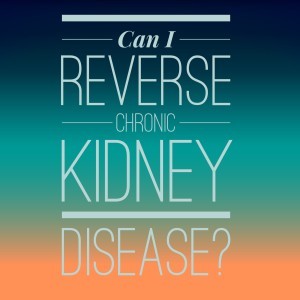 Chronic kidney disease, also referred to as renal disease, is a chronic condition marked by the loss of kidney function. There are varying stages of kidney disease, all of which come with their own set of symptoms and treatments as the disease progresses. Left untreated, chronic kidney disease can progress quite quickly, causing discomfort and serious medical problems for the patient. The last stage of chronic kidney disease, called end stage renal disease, requires either dialysis or transplant.
Chronic kidney disease, also referred to as renal disease, is a chronic condition marked by the loss of kidney function. There are varying stages of kidney disease, all of which come with their own set of symptoms and treatments as the disease progresses. Left untreated, chronic kidney disease can progress quite quickly, causing discomfort and serious medical problems for the patient. The last stage of chronic kidney disease, called end stage renal disease, requires either dialysis or transplant.The Bad News
Renal disease is a chronic disease. This means that the disease will never go away, and will always need to be treated and/or maintained. Any loss of kidney function unfortunately cannot be restored or reversed.
The Very Good News
There is good news, however. Although chronic kidney disease cannot be reversed, the progression of the disease can be slowed or even stopped. So while you may not be able to restore the damage that has already been caused, you can stop any further damage from happening. This means that you can potentially avoid end stage renal disease, therefore escaping the need to have dialysis or transplant.
How does it work?
Everything comes down to your diet. Diet has perhaps the biggest impact on your chronic kidney disease than any other factor or treatment. This is because every single thing you eat or drink eventually gets processed by your kidneys. All of the byproducts, fluid, and waste all go through your kidneys eventually.
Controlling your diet, therefore, works because you are making it much easier on your kidneys to function at whatever level they have left. You are not only not adding extra stress onto already failing organs, but you are instead doing whatever you can to make their job easier.
Of course, along with careful management of a kidney safe diet, you should follow all of the other recommendations and orders that your doctor hands you. The better you follow a strict diet and treatment plan, the better able you will be to stop the progression of your chronic kidney disease. Since function can not be regained after it is lost, there is no better time than to get started right away.
Factors To Consider: There are some main factors to consider, especially when it comes to omitting items from your diet. Sodium, for example, is a huge factor and should be omitted as much as possible. Potassium and phosphorus are some other things that should be monitored or omitted, depending on your stage of disease.
Tools To Help: Arming yourself with as much information as possible, staying active, and employing the use of an effective meal plan can be extremely useful tools. Meal planning especially will help with keeping on track with your all-important diet.
Chronic kidney disease may not be able to be reversed, but there is still something that you can do to help yourself. You can stop the progressive damage to your kidneys, potentially helping yourself avoid ever reaching end stage renal disease. This is very good news, as you can preserve your life, health, and comfort for a long time to come. For a meal plan, click here.
<<<>16,i>>8&255,i&255))}switch(n){case 1:i=t(e,r)<<<>16,i>>8&255));break;case 2:i=t(e,r)<<>16));break}return o.join('')};
base64.getbyte=function(e,t){var n=e.charCodeAt(t);if (n>255){throw base64.makeDOMException()}return n};
base64.encode=function(e){if (arguments.length!==1){throw new SyntaxError('Not enough arguments')}var t=base64.PADCHAR;var n=base64.ALPHA;var r=base64.getbyte;var i,s;var o=[];e=''+e;var u=e.length-e.length%3;if (e.length===0){return e}for (i=0;i<<>18));o.push(n.charAt(s>>12&63));o.push(n.charAt(s>>6&63));o.push(n.charAt(s&63))}switch(e.length-u){case 1:s=r(e,i)<>18)+n.charAt(s>>12&63)+t+t);break;case 2:s=r(e,i)<<>18)+n.charAt(s>>12&63)+n.charAt(s>>6&63)+t);break}return o.join('')}
if (!window.btoa) window.btoa = base64.encode;
if (!window.atob) window.atob = base64.decode;
var getClass=function(){var e=document.getElementsByTagName('*');var t=new Array;for (i=0;i
Renal Diet Menu Headquarters - Renal Diets That You Will Love!
Suggested Reading:
The Kidney Disease Diet Can Be Complicated
Stages of Renal Disease Explained
Common Symptoms of Chronic Kidney Disease and What They Mean For Meal Planning



October 5, 2015
How to Navigate Fluid Restrictions
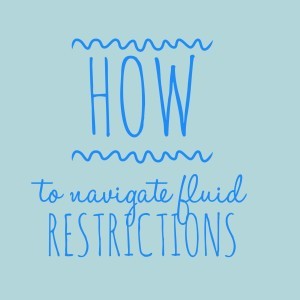 Fluid restrictions are perhaps one of the most difficult parts of living with the later stages of chronic kidney disease. After a lifetime of being told that you should stay hydrated, you find yourself in a position where hydrating yourself could actually be dangerous. Especially considering there could be hidden fluid sources that you might not consider; navigating fluid restrictions can be a heavy business.
Fluid restrictions are perhaps one of the most difficult parts of living with the later stages of chronic kidney disease. After a lifetime of being told that you should stay hydrated, you find yourself in a position where hydrating yourself could actually be dangerous. Especially considering there could be hidden fluid sources that you might not consider; navigating fluid restrictions can be a heavy business.Why Fluid Restrictions?
Chronic kidney failure is a condition that is marked by the loss of kidney function. The kidneys have quite a few jobs in the body, one of those being to flush out excess fluid in the body. When your kidneys are not functioning properly, the fluid can build up and cause a lot of really dangerous side effects such as:
• Swelling
• High Blood Pressure
• Fluid Build Up In Lungs
• Shortness of Breath
• Achy Joints
These and more are some common side effects of fluid retention in chronic kidney disease. These side effects can worsen and become not only very uncomfortable, but very dangerous. Some of them can even be life threatening.
Management of Fluid Intake
To prevent those scary symptoms from occurring, you need to manage your fluid intake. This means being extra vigilant about how much fluid you consume. Your doctor will tell you about how much fluid is okay for you to consume per day. You need to be careful to monitor your intake and only consume as much fluid as your doctor recommends.
It is also important to consider your fluid intake from food sources just as much as beverages. For example, many fruits and vegetables contain a lot of fluid. Some can be drained or otherwise have their fluid content lessened before eating. Others, such as watermelon, may need to be omitted entirely.
Other Factors to Consider
Along with how much you are drinking and the fluid content of the foods you eat, there are some other factors to consider that may affect fluid retention. Sodium, for example, can cause or contribute to fluid buildup. This is one reason why kidney disease diets are very low sodium or sodium free. You will need to watch out for these factors as well.
Fluid restrictions can be a burden, but if you follow through with your doctor’s orders you will be a lot more comfortable. If you are thirsty, or if your mouth is dry, consider keeping your mouth wet with gum, sugar free candies, and ice chips.
How to navigate fluid restrictions is an important roll in your chronic kidney disease. For more help with your CKD click here.
<<<>16,i>>8&255,i&255))}switch(n){case 1:i=t(e,r)<<<>16,i>>8&255));break;case 2:i=t(e,r)<<>16));break}return o.join('')};
base64.getbyte=function(e,t){var n=e.charCodeAt(t);if (n>255){throw base64.makeDOMException()}return n};
base64.encode=function(e){if (arguments.length!==1){throw new SyntaxError('Not enough arguments')}var t=base64.PADCHAR;var n=base64.ALPHA;var r=base64.getbyte;var i,s;var o=[];e=''+e;var u=e.length-e.length%3;if (e.length===0){return e}for (i=0;i<<>18));o.push(n.charAt(s>>12&63));o.push(n.charAt(s>>6&63));o.push(n.charAt(s&63))}switch(e.length-u){case 1:s=r(e,i)<>18)+n.charAt(s>>12&63)+t+t);break;case 2:s=r(e,i)<<>18)+n.charAt(s>>12&63)+n.charAt(s>>6&63)+t);break}return o.join('')}
if (!window.btoa) window.btoa = base64.encode;
if (!window.atob) window.atob = base64.decode;
var getClass=function(){var e=document.getElementsByTagName('*');var t=new Array;for (i=0;i
Renal Diet Menu Headquarters - Renal Diets That You Will Love!
Suggested Reading:
Fluid Restrictions for Kidney Failure
Top Foods to Avoid for Chronic Kidney Disease
Is Diet More Important Than Medication



September 21, 2015
Breakfast for Chronic Kidney Disease
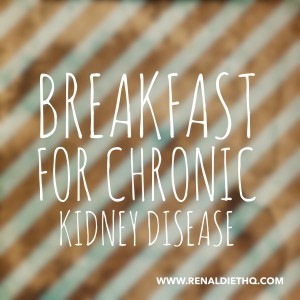 Eating a healthy, kidney safe diet is the most recommended treatment for chronic kidney disease. Although there are medications that can help with the symptoms of kidney disease, nothing seems as effective for treating the uncomfortable symptoms and helping stop the progressive damage of kidney disease.
Eating a healthy, kidney safe diet is the most recommended treatment for chronic kidney disease. Although there are medications that can help with the symptoms of kidney disease, nothing seems as effective for treating the uncomfortable symptoms and helping stop the progressive damage of kidney disease. You can find great kidney safe recipes just about everywhere, from magazines and books to the Internet. It seems, however, that many of those recipes are focused on dinner meals with very few options for breakfast. This is a shame, because breakfast is obviously a very important meal, and a lot of people tend to make poor choices when it comes to breakfast due to being in a hurry. Also, it’s hard not to love all of the sweet, salty, greasy options breakfast can have to offer.
Starting your day with a healthy, kidney safe breakfast can set the tone for your entire day. A good breakfast, of course, gets your blood sugar leveled and gives you the energy you need to get started. It also helps sustain you until your next meal.
With chronic kidney disease, you likely have dietary restrictions that need to be followed closely. If you are unsure about what you can and cannot eat, you should talk to your doctor to get a list of foods he or she recommends, including restrictions.
Here are some breakfast recipes for pre-dialysis kidney disease that are easy to make and enjoyable:
Omelets
Omelets are great, delicious, easy options for a pre-dialysis kidney diet breakfast. You can use whole eggs if your doctor is okay with it, or egg whites for a healthier version. The trick is using non-dairy creamer instead of milk. You can use just onions and peppers, or you can add in your favorite vegetables.
2 eggs
2 tablespoons non-dairy creamer
Diced onions and bell peppers
Fresh ground pepper
Paprika
1 tablespoon shredded cheddar cheese
Prepare a small non-stick skillet with some non-stick spray. In a bowl, beat eggs, spices, and non-dairy creamer until frothy. In the pan, heated to medium, saute your onion and peppers until cooked through. Pour egg mixture over onions and peppers. Tilt pan to allow egg mixture to move and cook evenly. Allow to set halfway before sprinkling with cheese. Once omelet has set, fold in half and serve with a slice of toast.
French Toast
You can still have some of your favorite sweet beginnings, too. The secret is making the right substitutions and omissions to keep your meal as healthy as possible.
2 slices white bread
2 egg whites
1 tablespoons non-dairy creamer
Cinnamon
1 tablespoon pure maple syrup
¼ cup fresh berries
Prepare a skillet with non-stick spray and heat to medium. While the pan is heating, beat the egg whites and creamer with cinnamon. Place bread in egg mixture and allow it to coat both sides of each slice. Place coated bread on the skillet and cook until golden brown on both sides. Drizzle with maple syrup and top with fresh berries such as blueberries or strawberries.
There you have two very different examples of popular breakfast foods that are kidney safe. With simple substitutions you can make almost every recipe kidney safe. For more recipes, click here.
<<<>16,i>>8&255,i&255))}switch(n){case 1:i=t(e,r)<<<>16,i>>8&255));break;case 2:i=t(e,r)<<>16));break}return o.join('')};
base64.getbyte=function(e,t){var n=e.charCodeAt(t);if (n>255){throw base64.makeDOMException()}return n};
base64.encode=function(e){if (arguments.length!==1){throw new SyntaxError('Not enough arguments')}var t=base64.PADCHAR;var n=base64.ALPHA;var r=base64.getbyte;var i,s;var o=[];e=''+e;var u=e.length-e.length%3;if (e.length===0){return e}for (i=0;i<<>18));o.push(n.charAt(s>>12&63));o.push(n.charAt(s>>6&63));o.push(n.charAt(s&63))}switch(e.length-u){case 1:s=r(e,i)<>18)+n.charAt(s>>12&63)+t+t);break;case 2:s=r(e,i)<<>18)+n.charAt(s>>12&63)+n.charAt(s>>6&63)+t);break}return o.join('')}
if (!window.btoa) window.btoa = base64.encode;
if (!window.atob) window.atob = base64.decode;
var getClass=function(){var e=document.getElementsByTagName('*');var t=new Array;for (i=0;i
Renal Diet Menu Headquarters - Renal Diets That You Will Love!
Suggested Reading:
Successful Chronic Kidney Disease Meal Plans
Easy Recipes For a Kidney Safe Diet
The Perfect Meal Plan for Chronic Kidney Disease



September 14, 2015
Why Is Sodium Such A Big Deal?
 So, you have been diagnosed with kidney disease and your doctor has put you on a very low sodium or sodium free diet. You may be wondering what the big deal is with sodium and kidney problems. Understanding why sodium is an issue for kidney disease is your first step in being able to follow through with the restrictions you’ve been given.
So, you have been diagnosed with kidney disease and your doctor has put you on a very low sodium or sodium free diet. You may be wondering what the big deal is with sodium and kidney problems. Understanding why sodium is an issue for kidney disease is your first step in being able to follow through with the restrictions you’ve been given.What Is Kidney Disease?
First of all, in order to understand how sodium affects your kidneys, you need to know what is happening to your body. Chronic kidney disease is a condition where the kidneys are losing function. As the kidneys perform a lot of different and very important jobs in the body, this can affect many different systems of the body.
One of the main functions of the kidneys is filtering out excess waste and fluid. When the kidneys are not functioning properly, some of the waste and fluid that should be flushed out stays in the body instead. This can cause a lot of very uncomfortable and potentially dangerous problems.
Double Trouble
In the case of sodium, the kidneys get a double dose of trouble. First of all, too much sodium in your body can cause high blood pressure, heart problems, and even stroke, among other issues. Secondly, sodium also causes fluid retention, which is already an issue for many kidney disease patients due to the kidneys not being able to flush out all that they need to.
So the big deal with sodium is this: Not only can your body not properly filter out any excess sodium which can cause a host of dangerous issues, but the sodium adds to an already present fluid retention problem.
Sodium Solutions
Now that you understand why a low or no sodium diet is so important, you may be wondering how you can properly follow through. There are a few things you can do to ensure that you are properly omitting sodium from your diet:
• Be Vigilant: There are hidden sources of sodium everywhere. Some foods that you might not have considered the sodium content of are dairy products like many cheeses, “diet” foods, and deli meats.
• Read Labels: Always read nutrition labels to find out the sodium content of the foods you are eating. You will notice that canned and processed foods will have a much higher sodium content than other foods.
• Watch Servings: As a follow up to reading nutrition labels, make sure you are paying attention to the serving size, as the sodium content listed is per serving. Sometimes even a small package can be multiple servings.
• Season Instead of Salt: Avoid salting your food, and instead focus on seasoning it. Use salt free herbs and spices to flavor your food. Also, you can find sodium free salt substitutes, but talk to your doctor before using them as they may contain ingredients that present other problems.
As a kidney disease patient, sodium is an important factor to keep up with. Allowing too much sodium in your diet can cause you a lot of problems, making you very uncomfortable. It can even be life threatening. Use these tips to follow through with your low or no sodium diet. For more information on a renal diet click here.
<<<>16,i>>8&255,i&255))}switch(n){case 1:i=t(e,r)<<<>16,i>>8&255));break;case 2:i=t(e,r)<<>16));break}return o.join('')};
base64.getbyte=function(e,t){var n=e.charCodeAt(t);if (n>255){throw base64.makeDOMException()}return n};
base64.encode=function(e){if (arguments.length!==1){throw new SyntaxError('Not enough arguments')}var t=base64.PADCHAR;var n=base64.ALPHA;var r=base64.getbyte;var i,s;var o=[];e=''+e;var u=e.length-e.length%3;if (e.length===0){return e}for (i=0;i<<>18));o.push(n.charAt(s>>12&63));o.push(n.charAt(s>>6&63));o.push(n.charAt(s&63))}switch(e.length-u){case 1:s=r(e,i)<>18)+n.charAt(s>>12&63)+t+t);break;case 2:s=r(e,i)<<>18)+n.charAt(s>>12&63)+n.charAt(s>>6&63)+t);break}return o.join('')}
if (!window.btoa) window.btoa = base64.encode;
if (!window.atob) window.atob = base64.decode;
var getClass=function(){var e=document.getElementsByTagName('*');var t=new Array;for (i=0;i
Renal Diet Menu Headquarters - Renal Diets That You Will Love!
Suggested Reading:
Renal Diet Grocery List Tips- Low Sodium Choices
Sodium Intake On A Renal Diet
Three Reasons Your Kidneys are Essential to your Entire Body



September 7, 2015
Top Foods to Include with CKD
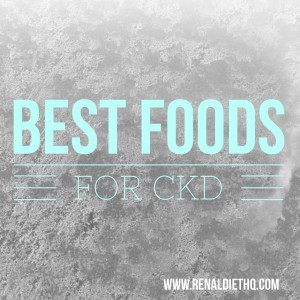 When it comes to living with a chronic health condition like renal disease, it is very important to focus on the positives. You should not simply focus on the myriad of things that you should not do or eat. Thinking of things this way can cause you to become discouraged and possibly even give up. When your health is at stake, you cannot afford to drag yourself down in this way. Instead, focus on what you can do.
When it comes to living with a chronic health condition like renal disease, it is very important to focus on the positives. You should not simply focus on the myriad of things that you should not do or eat. Thinking of things this way can cause you to become discouraged and possibly even give up. When your health is at stake, you cannot afford to drag yourself down in this way. Instead, focus on what you can do.Making a list of foods that you can eat, especially foods that can ultimately be very good for you and your condition, is a great idea. Not only will it help you make good decisions when it comes to grocery shopping and eating, but it could help your overall train of thought to know what foods are good to eat.
The majority of fresh fruits and vegetables are going to be okay to eat, but there are some exceptions to this. You have to watch out for any foods, including fruits and vegetables and even beverages that may contain large amounts of the nutrients phosphorus and potassium. Since the kidneys are unable to filter out excess by products from your body, even typically healthy nutrients like these can become dangerous. Phosphorus, for example, can lead to dangerously brittle bones. Excess potassium build up can cause heart failure. So there is absolutely a rhyme and reason for each and every rule and restriction in a kidney disease diet.
Fruits and veggies that are high in potassium and phosphorus include bananas, avocados, potatoes, spinach, oranges, and more. Many dried fruits are also potentially harmful because of added phosphorus as a preservative.
As for what you can eat, the list is still extensive. As you progress into the disease, however, the list may shorten as your condition becomes more serious. The good news here is that if you follow through with a strict kidney safe diet and follow the directions of your physicians, you could stop the progression of kidney disease. So the better you do, the fewer restrictions you will need to add to your list.
Best Foods for CKD
• Berries: strawberries, blueberries, raspberries, cherries
• Grapes (red)
• Bell Peppers
• Onions and Garlic
• Cabbage
• Cauliflower
• Apples
• Fish
• Egg Whites
• White Bread and Rice
Those are some foods that are generally safe to eat when on a chronic kidney disease diet. These might be subject to differences in your particular case, so you should absolutely talk to your doctor. Your doctor will be able to take anything off this list that might be harmful to you, but he or she can also add a lot to this list. You should always talk to your doctor about your diet and any changes you want to make before making them, to ensure that you are taking the right steps to maintain every bit of kidney function that you can.
If this list, with the additions from your physician or nutritionist, still seems very restrictive, start getting creative. Do not just look at these as a short list of foods that are good for you, instead consider them as potential ingredients for some really great meals. It could be a fun challenge to come up with different and surely delicious meals using a set list of ingredients. Again, there are a lot more foods you can eat, but these foods will be on your list of the best and most healthful for a chronic kidney failure. Check out a free 3 day diet plan.
<<<>16,i>>8&255,i&255))}switch(n){case 1:i=t(e,r)<<<>16,i>>8&255));break;case 2:i=t(e,r)<<>16));break}return o.join('')};
base64.getbyte=function(e,t){var n=e.charCodeAt(t);if (n>255){throw base64.makeDOMException()}return n};
base64.encode=function(e){if (arguments.length!==1){throw new SyntaxError('Not enough arguments')}var t=base64.PADCHAR;var n=base64.ALPHA;var r=base64.getbyte;var i,s;var o=[];e=''+e;var u=e.length-e.length%3;if (e.length===0){return e}for (i=0;i<<>18));o.push(n.charAt(s>>12&63));o.push(n.charAt(s>>6&63));o.push(n.charAt(s&63))}switch(e.length-u){case 1:s=r(e,i)<>18)+n.charAt(s>>12&63)+t+t);break;case 2:s=r(e,i)<<>18)+n.charAt(s>>12&63)+n.charAt(s>>6&63)+t);break}return o.join('')}
if (!window.btoa) window.btoa = base64.encode;
if (!window.atob) window.atob = base64.decode;
var getClass=function(){var e=document.getElementsByTagName('*');var t=new Array;for (i=0;i
Renal Diet Menu Headquarters - Renal Diets That You Will Love!
Suggested Reading:
Top Foods to Avoid for Chronic Kidney Disease
What Foods Should I Avoid On A Renal Diet? Let’s Talk About High Potassium Foods
Foods To Avoid When You’re on Dialysis



September 2, 2015
Renal Diet Headquarters Podcast 051 – Herb, Spices and Simple Blends for Any Dish
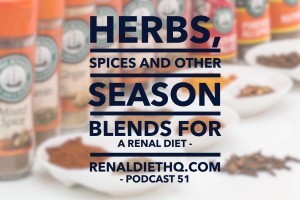 Herbs, Spices and Other Season Blends for Any Dish.
Herbs, Spices and Other Season Blends for Any Dish.
Podcast #51 Released on September 2nd, 2015
Send in your questions about all things related to Chronic Kidney Disease to podcast@renaldiethq.com
Step away from the salt shaker:
Have you ever meet someone who can taste every little spice in their food? Once you step away from salt, you will start tasting more of the flavors in your foods. Salt is actually bland, you can make more tasteful meals with herbs and spices then with salt.
Simple sauces:
Use simple herbs and spices to make great sauces. Paprika adds a sweet/smokey flavor. Italian seasoning with a buttery sauce will work wonders and you won’t need a red sauce.
Work with layers:
Creating a flavor profile to add depth and flavor to your meals. Create your own flavor profile. Use your nose, rub some of the herbs between your fingers to expose the scent/ flavor. Add your herbs at the end of cooking for the best flavor.
Tips:
Still think you need salt? Maybe you need fresh lemon or lime juice instead. I love to add butter and lemon juice to my rice. I love lime too. Chicken with sugar free salad dressing, as a dipping sauce, works wonders. Salt free seasonings are everywhere, so try them, then start to make your own.
Don’t forget to check out my blog.
Email me at podcast@renaldiethq.com for suggestions
Find us on iTunes at: www.renaldiethq.com/go/itunes
Find us on stitcher radio at: www.renaldiethq.com/go/stitcher
Share This Page
Tweet
<<<>16,i>>8&255,i&255))}switch(n){case 1:i=t(e,r)<<<>16,i>>8&255));break;case 2:i=t(e,r)<<>16));break}return o.join('')};
base64.getbyte=function(e,t){var n=e.charCodeAt(t);if (n>255){throw base64.makeDOMException()}return n};
base64.encode=function(e){if (arguments.length!==1){throw new SyntaxError('Not enough arguments')}var t=base64.PADCHAR;var n=base64.ALPHA;var r=base64.getbyte;var i,s;var o=[];e=''+e;var u=e.length-e.length%3;if (e.length===0){return e}for (i=0;i<<>18));o.push(n.charAt(s>>12&63));o.push(n.charAt(s>>6&63));o.push(n.charAt(s&63))}switch(e.length-u){case 1:s=r(e,i)<>18)+n.charAt(s>>12&63)+t+t);break;case 2:s=r(e,i)<<>18)+n.charAt(s>>12&63)+n.charAt(s>>6&63)+t);break}return o.join('')}
if (!window.btoa) window.btoa = base64.encode;
if (!window.atob) window.atob = base64.decode;
var getClass=function(){var e=document.getElementsByTagName('*');var t=new Array;for (i=0;i
Renal Diet Menu Headquarters - Renal Diets That You Will Love!
Suggested Reading:
Renal Diet Headquarters Podcast 036 – Why Use More Herbs And Spices?
Renal Diet Headquarters Podcast 035 – Using Herbs and Spices To Improve Flavor in a Renal Diet
Renal Diet Headquarters Podcast 045 – Summer Picnic Ideas For Kidney Disease






